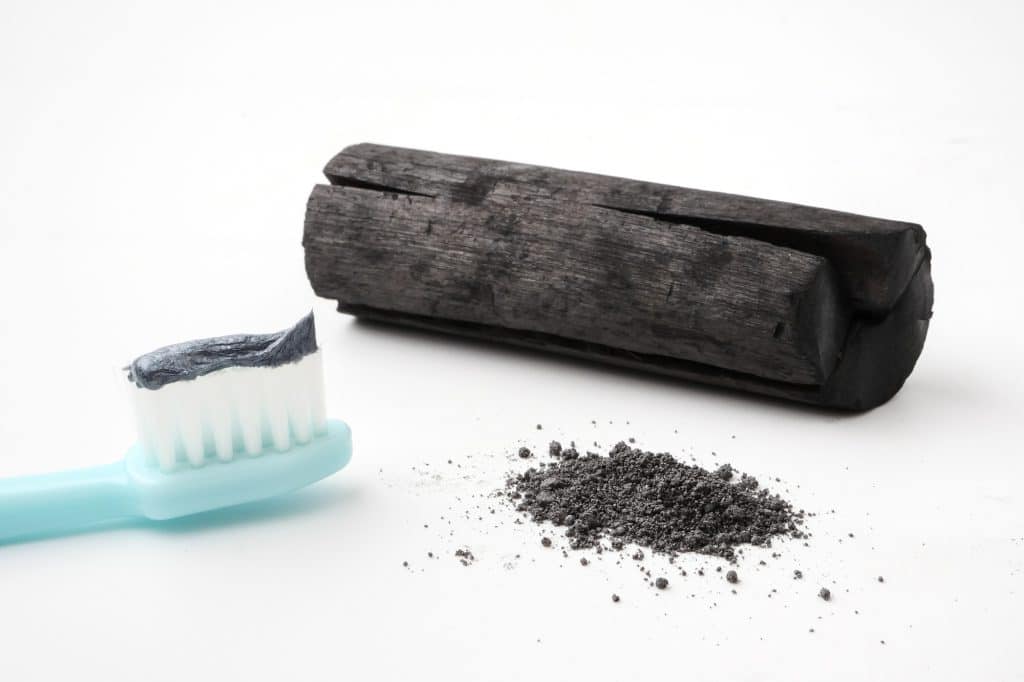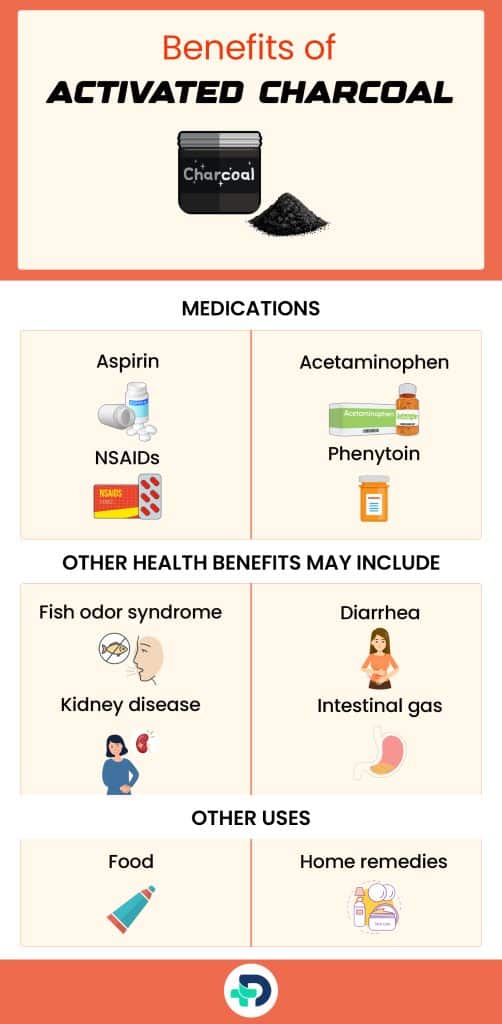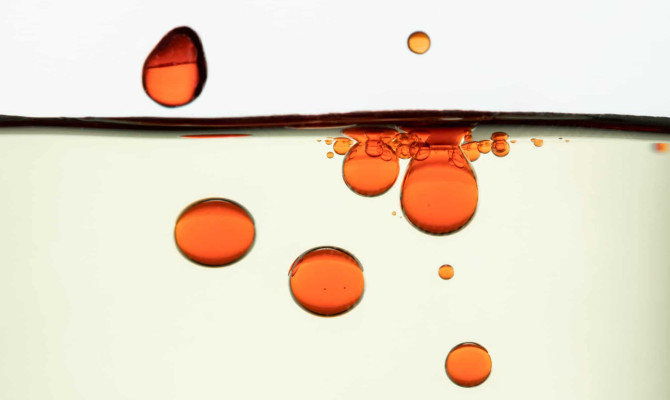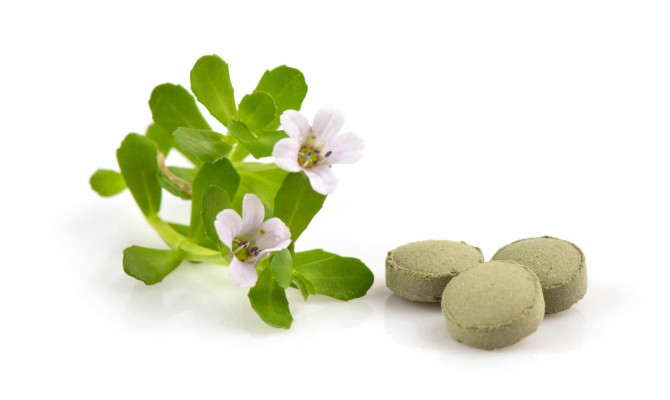What is Activated charcoal and its benefits

- Activated Charcoal
- 16 Aug 2023
Overview
What is Activated charcoal?
Activated charcoal, often called activated carbon, is a black, tasteless, and odorless powder that has been relied on for medicinal purposes since the beginning. Charcoal that has undergone a high-temperature oxygen treatment process to increase its porosity is known as activated charcoal. This procedure alters its internal structure, resulting in smaller pores and a larger surface area.1Overview| Researched based study from Nlm.nih.gov
A description of charcoal’s adsorbent qualities dates back to the 1700s. 1Overview| Researched based study from Nlm.nih.gov In 1811, French chemist Michel Bertrand reportedly consumed charcoal and 5 g of arsenic trioxide for the first time as an antidote.2Overview| Researched based study from Nlm.nih.gov

This article describes some information about activated charcoal, how it functions, what health advantages are supported by science, any associated risks, and any adverse effects.
Mechanism
Mechanism of action
- Toxins consumed are adsorbed by activated charcoal in the digestive tract, blocking their systemic absorption.
- Only poisons dissolved in a liquid can be directly taken away by activated charcoal.
- It comes into touch with ingested poisons if the medication is still not absorbed from the stomach or intestine.
- Activated charcoal taken orally operates in the gastrointestinal (GI) tract unaltered as it is not absorbed by the gut.3Mechanism| Researched based study from Nlm.nih.gov
Dosage
Recommended dosage of activated charcoal
- It is available as both suspension and powder suspension.4Dosage| Researched based study from Mayoclinic.org
- If activated charcoal hasn’t been blended, a slurry can be created by combining it with a suitable liquid of 1 to 8, such as water, cola, or flavored syrups.
For poisoning
- It is given in a Single dose of Activated charcoal (SDAC) or Multiple doses of Activated charcoal (MDAC) based on the substance that caused the poisoning.
Single dose Activated charcoal (SDAC)
- Infants from birth to 1 year – 10 to 25 g 3Dosage| Researched based study from Nlm.nih.gov
- Children – 2 to 12 years – 25 to 50 g
- Teenagers and adults – 50 to 100 g
Multiple-dose activated charcoal (MDAC)
- Refers to two or more successive doses of activated charcoal for improved toxin removal.
- Kids till 13 years – first dose of 10 to 25 g, then subsequent dosing is based on body weight.4Dosage| Researched based study from Mayoclinic.org
- Teenagers and adults – initial dose of 25 to 100 g, then repeated doses of 10 to 25 g for every 2 to 4 hours 3Dosage| Researched based study from Nlm.nih.gov
For oral use
- Ready-to-use formulations with sorbitol already added, as well as 15 g, 25 g, and 50 g dosages of aqueous activated charcoal suspension available.3Dosage| Researched based study from Nlm.nih.gov
Storage
Storage
- To preserve the product’s properties, activated carbons must be stored and shielded from moisture.
- Additionally, it should be stored away from solvents to prevent the chance of activated carbon absorbing their fumes or vapors.
- Liquid oxygen, ozone, and strong oxidants that can ignite quickly are incompatible substances and should be kept away.5Storage| Researched based study from Activatedcarbon.org
Benefits

Benefits of activated charcoal
Poisoning
- Activated charcoal can be taken internally to stop poisoning by trapping medicines and other substances. It should only be used when instructed by a medical practitioner, along with standard poisoning treatments.6Benefits| Researched based study from Nlm.nih.gov
Activated charcoal frequently aids in the removal of contaminants and medications such as:
- Aspirin.
- Acetaminophen.3Benefits| Researched based study from Nlm.nih.gov
- NSAIDs.
- Phenytoin.
- Calcium channel blockers.
- Tricyclic antidepressants.
- Sedatives.
- Theophylline.3Benefits| Researched based study from Nlm.nih.gov
- Other inorganic and organic materials.
Other health benefits may include
- Fish odor syndrome or trimethylaminuria (TMAU) – Activated charcoal may aid people with fish odor syndrome, a condition in which the body builds up trimethylamine (TMA). This substance has a fishy stench.7Benefits| Researched based study from Nlm.nih.gov ,8Benefits| Researched based study from Nlm.nih.gov
- Kidney disease – According to a study conducted on older adults, activated charcoal may aid in improving kidney function in those with chronic renal disease and lower urea and creatinine blood levels.9Benefits| Researched based study from Nlm.nih.gov
- Intestinal gas – Activated charcoal can be used to reduce excessive gas formation, according to a panel of the European Food Safety Authority (EFSA), whose research is still in its early stages10Benefits| Researched based study from Uclahealth.org
- Diarrhea – Researchers concluded that by trapping harmful germs and medications on its porous, rough surface, it would be able to limit their absorption into the body and cause diarrhea. 11Benefits| Researched based study from Tandfonline.com
Other uses
- In food – Toothpaste and ice cream are two products that include activated charcoal.
- Various home remedies – Additionally, although many individuals use it as a home cure for various issues, like water purification, skin treatment, and tooth whitening, there is scant scientific evidence to back up these claims.
- Purification of medicines, injectable fluids, contrast media, paracetamol, and vitamins are just a few examples of solutions purified using activated carbon.5Benefits| Researched based study from Activatedcarbon.org
Side effects
Side effects
It is often regarded as safe to use. The most frequent side effects could be
- Vomiting.
- A dark-tarred stool.
- Constipation.12Side effects| Researched based study from Medlineplus.gov
What other risks are associated with activated charcoal?
Although there are not many known adverse effects of using activated charcoal, there are still some risks, as follows:
- When receiving activated charcoal, unconscious patients risk aspirating vomit or wrongly inserted nasogastric tubes, which can cause aspiration pneumonitis, severe respiratory problems, and occasionally even death.
- Intestinal blockage may be more likely in patients who have already developed motility issues, are on opioids or antimuscarinic medications, or are being treated with MDAC.3Side effects| Researched based study from Nlm.nih.gov
Precautions
Precautions
- Some activated carbons are available as powders. Therefore, it is essential to prevent inhaling this dust, skin and eye contact, generation, and distribution of dust.
- Additionally, activated carbons draw oxygen from the air, lowering the oxygen available for breathing; hence, people should store them in adequately ventilated areas.5Precautions| Researched based study from Activatedcarbon.org
- Activated charcoal shouldn’t be given before the endoscopy operation because it could impair endoscopic visibility.
- It shouldn’t be used to treat all poisoning because it is ineffective at getting rid of some toxins such as metals, acids, alkalis, electrolytes, alcohol, and petroleum compounds. 3Precautions| Researched based study from Nlm.nih.gov
- Before taking activated charcoal, pregnant women and nursing moms should speak with a doctor.
Interactions
Interactions of activated charcoal
The following products may interact when used with activated charcoal:
Oral drugs
- The stomach and intestines absorb fewer drugs and other chemicals when activated charcoal is present, thus decreasing the effects of the medicines.
Birth control pills
- The amount of birth control pills the body absorbs might be reduced by taking activated charcoal along with them, thus decreasing its efficiency.
- To prevent this interaction, use activated charcoal at least three hours after or twelve hours before taking birth control pills.13Interactions| Researched based study from Uwmedicine.org
Alcohol (ethanol)
- Consuming alcohol and activated charcoal may make it less effective at preventing poison absorption.12Interactions| Researched based study from Medlineplus.gov
Ipecac syrup
- Can be bound by activated charcoal in the stomach. This lessens the effects of ipecac syrup.12Interactions| Researched based study from Medlineplus.gov
Not all medications which interact with activated charcoal are listed above. Before using activated charcoal, it is advised that the patient discuss all medications, including prescription, over-the-counter, herbal, and other supplements, to avoid any potential interactions.
Bottom line
The bottom line
Like any other active substance or medicine, activated charcoal should be cautiously handled. Although it has been utilized for various health benefits, only a small number of them are supported by science, and many claims still need more investigation to be proven true. Before using activated charcoal to back up any of its health claims, it is best to talk with a doctor about the dangers and advantages.
Any feedback on this article?
 This Articles content was accurate
This Articles content was accurate Very Informative Article
Very Informative Article I have a question or a comment
I have a question or a comment
 This article contains inaccurate content
This article contains inaccurate content This article was not helpful
This article was not helpful I have a question or a comment
I have a question or a comment
We appreciate your helpful feedback!
Checkout our social pages
References
-
National Library of Medicine
Activated Charcoal—Past, Present and Future | Overview
-
National Library of Medicine
Activated charcoal for acute overdose: a reappraisal | Overview
-
National Library of Medicine
Activated Charcoal | Mechanism | Dosage | Benefits | Side effects | Interactions
-
Mayo Clinic
Activated charcoal (Oral route) | Dosage
-
Activated charcoal Producers association
Activated charcoal | Storage
-
National Library of Medicine
The Use of Activated Charcoal to Treat Intoxications | Benefits
-
National Library of Medicine
AB134. Trimethylaminuria: report of two cases in Ramathibodi hospital | Benefits
-
National Library of Medicine
Primary Trimethylaminuria | Benefits
-
National Library of Medicine
Combination of oral activated charcoal plus low protein diet as a new alternative for handling in the old end-stage renal disease patients | Benefits
-
UCLA Health
Does Activated Charcoal Help with Gas and Bloating? | Benefits
-
Taylor & Francis online
Is there a role for charcoal in palliative diarrhea management? | Benefits
-
Medline Plus
Activated Charcoal | Side effects | Interactions
-
UW Medicine
Activated Charcoal Is Trendy—But Is It Safe? | Interactions




































